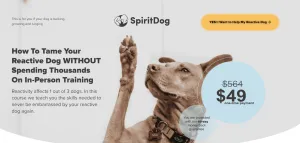It’s no secret that many dog owners find themselves frustrated with their furry friend at one time or another.
Whether it’s excessive barking, chewing on furniture, or never coming when called, dogs can be downright frustrating!
If your dog is making you unhappy, try to figure out why and fix the problem. Maybe you’re incompatible, or you’re not providing the right environment or training.
If you’re unsure what the problem is, consult a professional. Meanwhile, try to keep your frustration under control and focus on the good parts of your relationship with your dog.
If you’re struggling to get along with your pup, don’t worry – here are a few tips to help ease the tension.
Table of Contents
ToggleContents of this article:
- My dog is making me miserable.
- Can having a dog cause depression?
- How can I stop being frustrated with my dog?
- Take time to understand your dog’s behavior.
- Implement control and management.
- Be consistent with your commands and expectations.
- Seek professional help if needed.
- Take deep breaths and stay calm.
- Shift your focus to positive reinforcement.
- Take a break if needed.
- Learn the triggers for your dog’s behavior.
- Create a plan.
- Identify what you can control.
- Remember that you’re not alone.
- Change your tone and your words.
- Have a routine.
- Be patient.
- Change the scenery.
- Is it ok to yell at your dog?
- Don’t use pain to discipline your dog.
- Avoid direct eye contact.
- Count the positives.
- Can dogs sense if you hate them?
- Is it normal to be depressed after getting a puppy?
- What happens if you don’t want your dog anymore?
- Am I a bad person for rehoming my dog?
- Will my dog miss me if I rehome them?
- Does owning a dog get easier?
My dog is making me miserable.
It’s not your dog’s fault that he’s doing these things that are making your life difficult. He doesn’t know any better. But you can change his behavior with a little bit of patience and perseverance.
Can having a dog cause depression?
Everyone knows that owning a dog is a lot of work. From feeding and walking to vet appointments and training, there’s a lot to think about. But sometimes, even when we’re prepared for the responsibility, it can be harder than we expected.
Maybe our dog is particularly high-energy and destructive, or maybe we’re just struggling to find the time to fit everything in. Whatever the case, it’s normal to feel overwhelmed at times.
However, it’s important to remember that our dogs rely on us for their care, and they deserve our best effort. If we’re feeling depressed or resentful, it may be time to ask for help from a friend or professional.
With a little support, we can make sure that our dogs have the happy and healthy lives they deserve.
How can I stop being frustrated with my dog?
The key to stopping frustration with your dog is figuring out the root of the problem.
Is your dog not listening to you because he’s not being trained properly? Are you not providing enough attention or exercise?
Once you identify the issue, you can take steps to fix it. If you’re still struggling, reach out to a professional for help. With a little patience and effort, you can get back to enjoying your furry friend.
Take time to understand your dog’s behavior.
Dogs are individuals, just like humans, and they each have their own personality, needs, and wants. In order to best care for your dog, it’s important to take the time to understand them as an individual.
What makes them happy? What scares them? What do they need from you?
By taking the time to get to know your dog, you can build a foundation of trust and communication that will make it easier to deal with frustrating situations when they arise.
Implement control and management.
One of the best ways to reduce frustration is to proactively manage and control situations that are likely to cause problems.
If you know your dog gets overexcited when visitors come over, put them in a separate room or crate until they calm down.
If the problem that drives you mad is counter surfing, put a stairgate across the kitchen door so your dog can’t access that area.
If your puppy has a shoe chewing habit, either use a puppy pen to keep them out of mischief when they’re not supervised or put the shoes away out of their reach.
There are a number of different ways to control and manage problem situations, so take some time to figure out what will work best for you and your dog.
Be consistent with your commands and expectations.
One of the biggest causes of frustration for both dog owners and dogs is inconsistency. If you’re constantly changing your mind about what you want or expect from your dog, they’re going to get confused.
It’s important to be clear and consistent in your commands and expectations. This doesn’t mean you can never change your mind – just be sure that when you do, you’re clear about the new rules.
By being consistent, you can help reduce frustration on both ends.
Seek professional help if needed.
If you’re finding yourself consistently frustrated with your dog, it may be time to seek professional help.
A certified trainer or behaviorist can assess the situation and provide guidance on how to best deal with your dog’s behavior. They can also help you identify any underlying issues that may be contributing to the problem.
If you’re struggling to care for your dog, don’t be afraid to ask for help. There are many resources available to you, and with a little support, you can get back on track.
Take deep breaths and stay calm.
It’s normal to feel frustrated with your dog from time to time. However, it’s important to stay calm when dealing with these situations.
Dogs are very sensitive to our emotions and can mirror our feelings. If you get angry or upset, your dog is likely to do the same.
Shift your focus to positive reinforcement.
When you’re feeling frustrated, it can be easy to dwell on the negative. However, this will only make the situation worse. Instead, try to focus on reinforcing your dog’s good behavior.
Look for opportunities to reward your dog, even if it’s just something simple and easy, like sitting without being asked. This can help them feel more confident and may help reduce frustration on both ends.
Take a break if needed.
If you’re feeling overwhelmed, it’s okay to take a break. Sometimes, the best thing you can do is walk away for a few minutes to calm down. This doesn’t mean you’re giving up – it just means you need a little time to regroup.
Once you’ve had a chance to calm down, you can approach the situation with a fresh perspective.
Learn the triggers for your dog’s behavior.
In order to best deal with your dog’s behavior, it’s important to understand what triggers it. Is there a certain time of day when they tend to be more active? Are there certain places or things that seem to make them anxious or stressed?
By understanding the triggers for your dog’s behavior, you can be better prepared to deal with it.
Create a plan.
Once you’ve identified the triggers for your dog’s behavior, it’s time to create a plan. This may include things like providing more exercise, avoiding certain triggers, or using positive reinforcement.
By having a plan in place, you can help reduce frustration on both ends and make it easier to deal with your dog’s behavior.
Identify what you can control.
There are many factors that can contribute to your dog’s behavior. However, not all of them are within your control. For example, you can’t control the weather or whether or not your dog will have an accident.
What you can control is how you react to the situation. By staying calm and focused, you can help reduce frustration on both ends.
Remember that you’re not alone.
If you’re struggling to deal with your dog’s behavior, it’s important to remember that you’re not alone. There are many resources available to help you, including books, websites, and trainers.
There is also a wealth of information available online. If you’re feeling overwhelmed, don’t hesitate to reach out for help.
Change your tone and your words.
Your tone of voice and the words you use can have a big impact on your dog’s behavior. For example, if you use a harsh tone when scolding your dog, they may become anxious or fearful.
Instead, try to use a calm and positive tone. This will help reduce frustration on both ends and may even help improve your dog’s behavior.
Have a routine.
Dogs thrive on routine. This may mean setting up a schedule for walks, feedings, and playtime. It can also mean using the same commands and rewards each time your dog displays good behavior.
If you’re inconsistent with your commands or rewards, it can be confusing for them and make it more difficult to deal with their behavior. Instead, try to be as consistent as possible.
Be patient.
Dogs are capable of learning, but it takes time. If you’re patient and consistent, you’ll be more likely to see results. However, if you become frustrated or give up too soon, it’s less likely that you’ll see any positive changes.
Change the scenery.
Sometimes, a change of scenery can make all the difference. If your dog is having trouble behaving in one environment, try taking them to another place. This may help reduce their stress levels and make it easier for them to focus on good behavior.
Is it ok to yell at your dog?
It’s not ok to yell at your dog. Yelling can be scary for them and may lead to more misbehavior.
If you are having trouble managing your dog’s behavior, it is important to stay calm and focused. This will help to keep the situation from getting worse and make it easier for both of you.
Don’t use pain to discipline your dog.
It might seem like a good idea to use pain to discipline your dog, but it’s actually not ok. Yelling, hitting, or otherwise causing pain will only scare your dog and make them more likely to misbehave.
If you are having trouble with your dog’s behavior, it is important to find a positive and effective way to deal with the situation. There are many resources available to help you, including books, websites, and trainers.
Avoid direct eye contact.
Direct eye contact can be interpreted as a challenge or threat. If you are trying to calm your dog, it is best to avoid making direct eye contact.
Instead, try to keep your body relaxed and look at the ground or away from your dog. This will help to reduce their stress levels and make it easier for them to focus on good behavior.
Count the positives.
It’s easy to focus on the negative when you’re dealing with a difficult situation. However, it’s important to remember the positives as well. For every time your dog misbehaves, there are likely many more times when they behave well.
By taking the time to focus on the positive, you can help reduce frustration and keep your dog’s behavior in perspective.
Can dogs sense if you hate them?
It’s unlikely that your dog knows if you hate them, but they can certainly sense if you’re frustrated or angry. Dogs are very in tune with their owner’s emotions and can pick up on subtle cues.
If you’re feeling stressed or frustrated, it’s likely that your dog will sense this and may become anxious or fearful. In some cases, this can lead to more misbehavior.
If you’re having trouble dealing with your dog’s behavior, it’s important to stay calm and focused. This will help reduce frustration on both ends and may even help improve your dog’s behavior.
Is it normal to be depressed after getting a puppy?
Yes, it’s normal to feel a range of emotions after getting a puppy. The first few weeks together can be a shock! It’s common to feel excited, scared, and overwhelmed all at the same time. It’s also normal to feel a bit depressed.
This is often due to the fact that puppies require a lot of care and attention. They need to be fed, walked, and played with regularly. This can be a lot of work, especially if you’re not used to it.
If you’re feeling depressed, it’s important to reach out for help. There are many resources available to help you, including books, websites, and trainers.
There is also a wealth of information available online. If you’re feeling overwhelmed, don’t hesitate to reach out for help.
What happens if you don’t want your dog anymore?
If you don’t want your dog anymore, the best thing to do is to contact their breeder or the rescue organisation you got them from, who can get involved to help find a new home for them. If this is not possible, you can also reach out to local shelters or rescue groups.
If you need to rehome your dog, it is important to do so in a safe and responsible way. This will help to ensure that they go to a wonderful home where they will be well-cared for.
If you’re feeling overwhelmed, don’t hesitate to reach out for help. There are many people and organizations who can help you find a new home for your dog.
Am I a bad person for rehoming my dog?
If you’re feeling like you can’t care for your dog anymore, reach out for help. There are many people and organizations who can help you find a new home for your dog.
You are not a bad person for rehoming your dog, but it’s important to do so in a safe and responsible way. This will help to ensure that they go to a wonderful home where they will be well-cared for.
Will my dog miss me if I rehome them?
There’s no way to know for sure, but dogs are very adaptable creatures and they quickly become attached to their new families. If you’re feeling guilty about giving your dog away, try to remember that you’re doing what’s best for them. They will be loved and well-cared for in their new home.
Does owning a dog get easier?
Puppies and dogs require a lot of care and attention, which can be overwhelming for some people. If you’re feeling depressed after getting a puppy, it’s important to reach out for help.
There are many resources available to assist you in caring for your new pet. Yelling at your dog is not ok and will only scare them. Focus on the positives and use treats and praise to help train your dog.
If you need to re-home your dog, do so in a safe and responsible way. There are many people and organizations who can help you find a new home for your dog. Remember, you’re doing what’s best for them.
References:
https://psychcentral.com/depression/puppy-blues
https://www.theguardian.com/lifeandstyle/2014/apr/27/our-pets-making-me-miserable-mariella-frostrup







